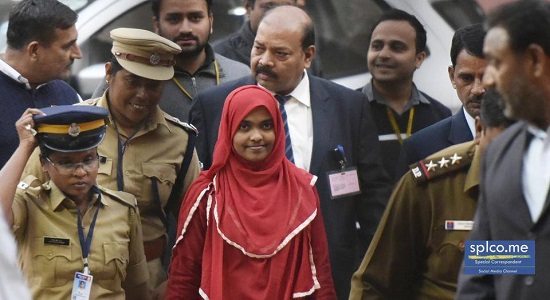The Supreme Court on Monday asked Hadiya, a 24-year-old woman from Kerala who converted from Hinduism to Islam, to return to a homeopathy college in Salem to complete her studies, freeing her from the custody of her parents.

A bench led by Chief Justice of India Dipak Misra, however, didn’t say anything on her husband Shafin Jahan’s plea against a Kerala high court order annulling their marriage. The matter, which has come to be known as the “love jihad” case and has a bearing on inter-religious marriages and a woman’s right to choose her partner, will now be heard in the third week of January.
“I want freedom… I want to complete my studies and live my life according to my faith and as a good citizen,” Hadiya said, when asked if she wanted to go back to college.
The court told the college to allow Hadiya to complete an internship and the Kerala Police to ensure she joined the institute in neighbouring Tamil Nadu at the earliest.
Hadiya’s marriage to Jahan was struck down on May 24 and her custody given to her parents, who challenged the relationship in the Kerala high court on the grounds that it was part of a systematic conversion drive.
“I want to meet my husband,” Hadiya said, adding that she was in unlawful custody for the last 11 months. She had spent five months in a girls’ hostel before being sent to her parents.
Hadiya wanted Jahan to be named her guardian. “Your husband cannot be your guardian. You can approach the dean if there are any problems,” the three-judge bench said.
The court accepted Hadiya’s submission that her husband would take care of the expenses but refused her request to be allowed to meet or talk to her husband freely. “Whatever the hostel rules say would be followed,” the court said.
The judges interviewed Hadiya, who arrived in Delhi on Sunday as the court wanted to speak to her, for almost 25 minutes in an open court, overruling her father’s plea for a closed hearing.
The hearing carried on beyond the court’s closing time of 5pm as the National Investigation Agency (NIA) wanted the judges to first take up its probe report into Hadiya’s and 11 similar cases of alleged forced conversions.
Born Akhila Ashokan, Hadiya married Jahan without her family’s consent last December. Her father, Ashokan KM, who retired from the army, approached the high court in May, alleging there was a “well-oiled systematic mechanism” for conversion and Islamic radicalisation that had trapped his daughter.
Additional solicitor general Maninder Singh on Monday backed the high court order annulling the marriage, saying NIA had gathered evidence to show the marriage was a sham.
The Kerala government, too, wanted the court to go through the NIA report before hearing Hadiya. Earlier in an affidavit, the state government had opposed an NIA probe, saying Hadiya’s was not a case of indoctrination and there were no forced conversions in Kerala.














